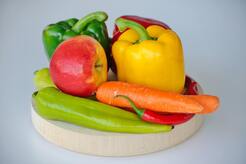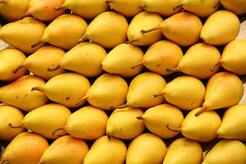|
By: Isabella Sferra In our modern and globalized society, food ingredients come from around the world. This has enabled the diversity and relative affordability of the products in today’s supermarkets. However, with this wide variety of sources, it can be difficult to ascertain the conditions that your food was made in. And make no mistake- environmental problems and human rights abuses are lurking in your grocery store. To illustrate the problem, let’s look at three common foods or ingredients with records of human rights and environmental issues. Palm Oil
Palm oil is a versatile oil derived from the fruits of the palm tree. It’s efficient and has many uses, and is in many, many products, according to an article from National Geographic. Unfortunately, WWF and other sources state that growth in its production has driven habitat loss and the CO2-releasing burning of rainforests in tropical countries. Furthermore, WWF and the Roundtable on Sustainable Palm Oil (RSPO) state that banning or boycotting the oil isn’t a feasible solution. Because it is so efficient-reducing the amount of land needed to grow it- so useful, and so many depend on it for their livelihood, sustainable farming is the key. When possible, look for RSPO-certified palm oil products to ensure that what you’re buying was made in an ethical manner. Dairy and Milk You probably know that eating less red meat is good for the planet. You probably know that cows produce large quantities of methane and CO2. But did you know how much, and did you consider that dairy may also be a part of the problem? The Chocolate Lastly, chocolate. Yes, one of America’s favorite flavors and desserts. And yes, it has its own issues. A recent article from Confectionary News on a preliminary report indicates that the prevalence of child labor has increased in cocoa-producing households in Côte d’Ivoire and Ghana. Both are major chocolate-producing areas. Another article from the website describes the low wages farmers are paid, and another from Candy Industry confirms the problem. Many make less than a living wage. Chocolate production in Africa has also been associated with large-scale deforestation, according to Fortune. This isn’t to say the farmers are to blame: many or most of them are in poverty and are simply trying to earn enough to survive. But change is necessary to ensure that chocolate production is fair and sustainable. To help out, look for chocolate companies that can prove that they pay their farmers fairly and strive for sustainable production, like Alter Eco. A Long-term Solution It’s important to remember that these are only three crops with environmental or human rights problems. There are many, many more out there. How is the average person supposed to figure it all out? How can you check every single ingredient in your food for its sustainability and fair treatment of workers and farmers? You can’t. When possible, and if you have the time, you can and should try to weed out the worst offenders and shop fair trade products (though even those have their problems). But I think this discussion brings us to a larger point about production chains and sustainability and human rights abuses in general: individual responsibility alone probably isn’t very effective in the long run. Personally, I think our best bet to increase the sustainability of our food is probably to create and enforce industry-wide standards for how materials and crops are grown and sourced. These could be maintained by the industries themselves or created by governments and applied to all foods sold in the country. Such standards would be broadly applicable, more efficient at weeding out unsustainable or cruelly made products, and reduce the burden on responsible consumers. So far, the actions of most governments have been piecemeal at best. I can only hope that this will improve in the future, as societies recognize the need for coordinated efforts in this area and others related to the environment and human rights. Until then, I hope consumers will do their best to pick up some of the slack and ensure that both the land that supports our food and the farmers who grow it are treated fairly.
0 Comments
Leave a Reply. |
TUGIWelcome to Seeds for Thought, the TUGI Blog where we will be highlighting incredible stories of environmental activists and change makers, environmental news, and tips to living a more green and sustainable lifestyle. If you are interested in learning more about what we are doing on a monthly basis, subscribe to our TUGI Newsletter. Archives
May 2021
Categories |
TUGI
|
|



 RSS Feed
RSS Feed
